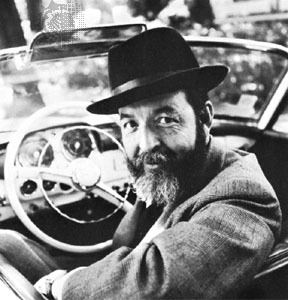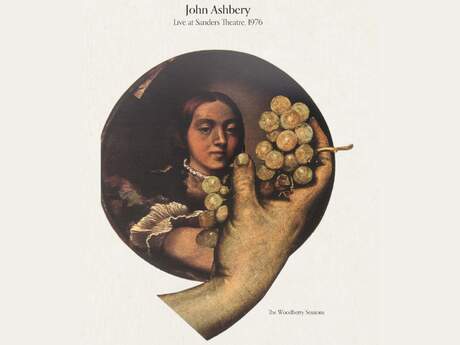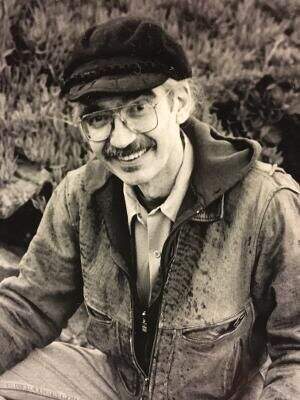Tributes
Mary von Schrader Jarrell on Randall Jarrell

Another Endangered Species: Reflections on Editing Randall Jarrell's Letters
Several indispensables came with Randall Jarrell into our fifteen-year marriage that were never entrusted to the moving vans on our moves from campus to campus but travelled crowdedly with us inside the incommodious but cherished two door Mercedes-Benz 190-SL convertible that Randall defended as "not task oriented."
To conserve space, Randall wore—weather permitting—his much-fancied bulky Irish cable-knit sweater that he wrote Peter Taylor was "the greatest piece of western sculpture since Donatello," and that Cal Lowell so avidly coveted we hid it in the camphor chest when he visited us.
Randall then allocated what took the most space, which was his fragile thirty-eight piece collection of Mahler's and Richard Strauss's Lotte Lehmann seventy-eights—essential to playing at top volume with the windows open when he graded his students' papers outdoors in the Pawley's Island hammock. Next, the canvas-clad tennis racket caringly clamped in its frame and always at hand in readiness for a spontaneous set. Then, our two bird binoculars, stored one under each seat; and, at last, when I was seated and buckled, came the grimy, bulging, tied-in-a-knot pillow-case, "Just some old, wartime letters I wrote Mackie," (his former wife), and that rode embraced on my lap for Kitten to rest upon.
When the furniture had been delivered, the letters to Mackie were installed under the conjugal bed behind the bedskirt in the company of elderly copies of Road and Track, Science Fiction, and High Fidelity.
* * *
Well over a year crept by after Randall's death before I extricated that knot and saturated my mind with the origins of the war poems from Little Friend, Little Friend and Losses: "The Soldier Walks Under the Trees of the University," ''Mail Call," The Lines," "Second Air Force," "The Death of the Ball Turret Gunner," et al. Those seventy-some letters Mackie fortuitously preserved and considerately released were hand scripted, rarely dated, generating many fraught queries from me, and radiating an off-putting editorial challenge. On the other hand, the more I delved into that wealth of literary and biographical detail the more it inspired me to go after hundreds of other letters to the extent that they became, in Dostoevski's words, my "ember in the blood." From the nearly 3,000 letters I recouped, I learned that letters are constantly in jeopardy. Randall's worst enemies were leaky attics, flooded basements, reckless discarding, random withholding and, yes, even university collection theft. His letters' best friends were women.
In my daily regimen, 6:30 a.m. to 11:30 a.m., of dating, sorting, and editing, two subjects evolved (as Randall would have said "providentially") destined for me to treat.
One was the life-long affection for each other apparent throughout these letters of twenty years between Randall, Peter, and Cal that survived in spite of their equal egos and unequal honors, remote addresses, divorces, second wives, and Cal's helpless manic rages that initially took the other two by surprise.
That occasion occurred when, in 1949, Peter—at Randall's instigation—planned to attend the awarding of an Honorary Degree by the University of North Carolina at Greensboro to Peter's Southern fiction colleague, Katherine Anne Porter. However, just days before the ceremony, Peter telephoned Randall that this was hopelessly impossible since Cal, "drawn by God," had arrived in Bloomington (where Peter taught) maniacally bent on converting Peter and total strangers to Catholicism. By an incredible coincidence one of the doorbells Cal rang chanced to be that of an off-duty Protestant police officer, whose first hint of resistance enraged Cal to violence resulting in arrest and Peter summoned.
On Peter's arrival, Cal made him kneel for hours while he pointed out the presence of the devil, whom they prayed to exorcise. At the changing of the guard, Peter's pleas for release to return to his convalescing wife and newly-born daughter fell on deaf ears as the replacements were unanimously convinced that Peter was an inmate, too. Vindication did not come easily but, free at last, Peter, shattered, telephoned Randall reporting that these were ''the worst hours of my life," "our friend is lost forever," and "it is out of the question for me to come to Greensboro." Randall, stunned, wrote:
Dear Peter:
We're sorry you're not coming down this month, but no wonder! It must have been dreadful for you. We were much shocked and grieved—and surprised. Maybe it'll turn out more of a "nervous breakdown" than of a lasting thing, though it sounds worse.
I'll stop—I don't approve of writing letters with a pencil.
Mackie sends her love to Eleanor.
Love,
Randall
Meanwhile, Cal's mother and Dr. Merrill Moore, the sonneteer, rescued Cal and entered him, hush-hush, in Baldpate Hospital near Georgetown, Massachusetts.
Dear Cal:
Mackie and I were terribly sorry to hear that you'd been sick. As soon as you're better we want you to come for a long visit, as long as you want. Kitten says Meow, Meow, meaning "Do Come."
Get better fast. Come to Greensboro and pretend to be Orpheus in Thrace.
Love,
Randall
Cal's reply in part was, "Mother of God, old Randible, there is no man I love more than you."
* * *
Randall craved letters and was restless until the afternoon delivery had come. Hannah Arendt, Elizabeth Bishop, Cal, the Taylor's, Adrienne Rich, editors, outstanding students, and former tennis partners all made his eyes light up. But he glowered at "Death-of-the-Ball-Turret-Gunner" permission requests, which somehow he could detect through unopened envelopes and flipped into my lap for me to tend to.
He didn't deign to speak about this, but I knew from his tight lips that having seven books of poetry in print and having won the National Book Award for The Woman at the Washington Zoo, he was vexed at publishers monotonously selecting that one little five-line poem that took so little space and earned such a little fee and was building his fame as a one-poem poet.
* * *
The irresistible lure for me to work with the Taylor letters once they were released lay in their abundant narrative revelations that would get me around Randall's objection to having a biography.
That was exactly the kind of meaty topic we saved to nourish ourselves with on long drives, and in 1963, with Randall's sabbatical on the calendar, there were months of long drives in the future.
When anglophile Taylor perceived that anglophobe Jarrell had included Taylor's incomparable England as a mere stopover on our travels to take delivery of a Jaguar at Coventry, he dispatched a benevolently instructive "not-to-bemissed" list he said was a going-away present. Peter's list was coupled with a last-minute phone call urging the hotel at Ross-on-Wye "where Dickens signed the guest register."
Dear Lucky People To Be Going To England
Don't Miss!
St. Mary's Church, Ewelme-near Oxford. Geoffrey Chaucer's son and all the family connections are buried here. But that's not the main thing, of course.
Church at Stoke-sub-Hampton, in Somerset where PeterTaylor got religion briefly during the War and had himself confirmed. But that's not the main thing, of course.
Ayenhoe Park, A Great House in Northamptonshire. Mostly 18th century. Beautiful furniture and china. We loved it. Belongs to the Cartwright family, fine old family without title and never wanted one.
Stow-on-the-Wold, near Oxford and Cheltenham. Can't remember the name of the hotel, but it is at the end of the big square. Wonderful food. This is where Eleanor and I sat down on the hot water bottles under the covers of our beds. Each of us thought there was something wrong with him or her and didn't speak of it for several minutes.
Though driving on the "wrong side of the road" with our costly, foreign, gear-shift car was hardly Randall's ideal, he hadn't the heart to ignore Peter's kindly-wrought instructions, and later he wrote back "I am amazed at the transformance of my feeling about England, thanks to you; and we are planning to return."
We were in Germany on our sabbatical, driving our "desert gold" two-door Jaguar XK 120with its orange genuine leather interior that Randall said was "the color of a new football." Our destination was Bamberg, Bavaria to see the life-size eleventh-century equestrian statue in a cathedral of a knight on horseback, known as The Rider when Randall dismissed the idea of a biography.
"So, why don't you want one, dear heart?"
"What, child? Put myself at the mercy of a translator's hand? Some creature out of the blue whom I've never met? Oh, hear the cuckoo... Ah, Europe."
And sure enough, after Randall's death, it was just as he predicted. Three writers who had never laid eyes on him offered themselves for my approval: one English, one American, and one a nun.
* * *
In a letter Randall wrote his friend Elisabeth in Vienna, he described himself as "someone whose principal work and amusement is reading, writing, and thinking about things." Thus, by his own hand and not a forbidden translator's, Randall in his letters autobiographically informs readers of
what he thinks and feels about Kitten, Johnny Unitas, Wimbledon, Tanaquil LeClerc, graphology, Freud, the Jaguar's new design for the headlights, Sviatislav Richter, Pancho Gonzales, and the dazzle of having a top coat tailormade on Savile Row. He writes to Cal that "Peter's Checkhovian prose is like a glass-bottom boat," and that Peter's wife "Eleanor's Calvinistic poetry is like going to the bottom. Touching and clutching the slimy green moss."
* * *
In the way that Mozart's letters speak for Mozart, Randall's letters are Randall. In lieu of meeting him, they are a way of becoming acquainted. Readers will find him as witty as Auden, but not so naughty; as honest as Conrad Aiken is but not so abject. More revealing than Evelyn Waugh; as "human" as Louise Bogan, but more profound. Except for two responses to attacks by The Nation and The New Republic, none of Randall's letters were written expressly for publication, as Edmund Wilson's were, nor as part of an intended literary estate, as Rilke's were.
Will his letters discredit him somewhat as Frost's did? Or ennoble him as Sandburg's did? I only know that if judgment is harsh, comfort is nigh in Harry Moore's words to Rilke's detractors, ''Those doing the judging could not have written the poems." Nor could they have survived the transitory stresses that beset the determined three-way fellowship of these men for twenty years.
In Cal's posthumous note to me in his book The Old Glory, which he had dedicated to Randall and Jonathan Miller, he wrote, "I am heartbroken Randall cannot have this book he loved—and helped." Peter's note to me grieved the recent loss of "my brother-in-law who introduced me to Tolstoy and Chekhov, Randall who taught me how to read them, and my father who showed me what they meant. I loved all three."
More than kisses
Letters mingle souls,
For thus friends
Absent speak.
—John Donne
Originally published in Crossroads, 2002.


